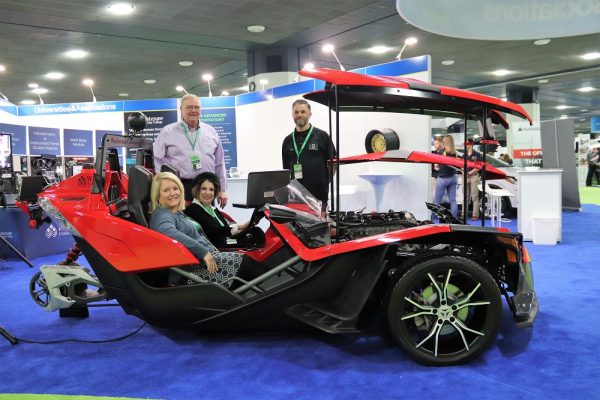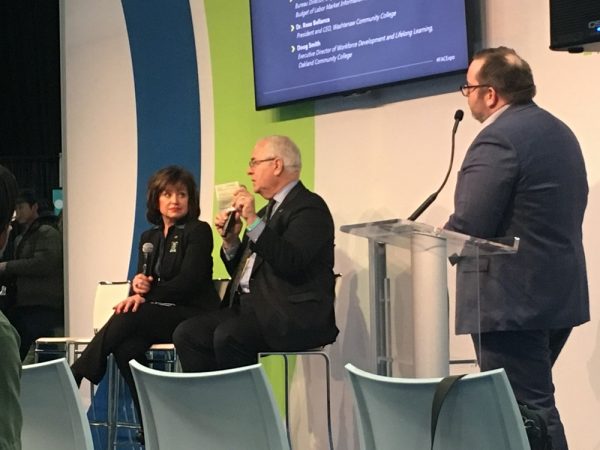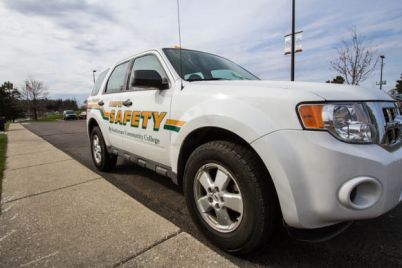
Cindy Millns, professional faculty of CIS and cybersecurity at WCC, and Susan Ferraro, director of media relations at WCC, test the seats of the Polaris Slingshot, which was modified for Level 2 self-driving capability. Joshua Mehay | Washtenaw Voice
Nicholas Ketchum
Deputy Editor
ATC shows off new tech at Automobili-D event
As news media got an exclusive view of the North American International Auto Show in the week preceding the public show in Detroit, Washtenaw Community College’s Advanced Transportation Center unveiled some cutting-edge auto tech.
The exhibition, which was held Jan. 14-17, was part of the “Automobili-D” event, hosted by the Michigan Economic Development Corporation to promote the state as a hub for the advanced transportation industry.
Two big pieces of gear were on display at WCC’s booth, in Hall E of the Cobo Center: a modified Polaris Slingshot outfitted with LIDAR and an “automotive hacking workbench” that exactly replicates various computers and networking in a particular vehicle.
Brandon Tucker, dean of advanced technology and public service careers at WCC, described the vehicle’s capabilities. He said students and faculty from the college’s Advanced Manufacturing labs had customized the Polaris Slingshot with modifications, endowing the vehicle with Level 2 self-driving capabilities.
Level 2 self-driving capability means that a vehicle can be driven “hands off” while the system handles acceleration, braking, and steering as the driver actively monitors. Levels 3, 4, and 5 imply “eyes off,” “mind off,” and “steering wheel optional” capabilities, respectively.
According to Tucker, at the exhibit, each modification to the Slingshot showcased a skillset or technology taught at the Advanced Manufacturing labs.
Custom modifications made to the vehicle include:
A dedicated short-range communication system.
Front and back LIDAR sensors, a detection system similar to radar, but uses lasers instead of radio signals.
A 360-degree object detection system that streams images to a connected monitor.
Several 3D-printed carbon fiber parts originating from WCC’s 3D Printing labs.
Various body panels, composed of lightweight composite materials such as front wings and engine covers.
Connection ports for diagnostics and data logging on a laptop computer mounted on the vehicle.
A plasma-cut LED-lit bridge displaying “Washtenaw Community College,” as well as WCC logo affixments on wheel stands and the engine.
Also on display at the WCC booth was a “mobile hacking workbench” built for the college by GRIMM, a Michigan-based cybersecurity research and development company.
According to a press release from WCC, the college is “believed to be the only college in the nation with such a cybersecurity tool.”
The mobile hacking workbench enables students and researchers to detect and diagnose vulnerabilities within vehicular systems in a safe and ethical manner. Specialized software is included to help monitor and isolate various streams of data for analysis.

WCC President Rose Bellanca appeared with Doug Smith of Oakland Community
College at a panel discussion on Jan. 17 during the Automobili-D event at Cobo
Center. Nicholas Ketchum | Washtenaw Voice
WCC President Rose Bellanca also took part in two panel discussions, the first entitled “Feeding the Beast: Keeping Up with Demand for Mobility Talent” and the second entitled “Lifelong Learning: Anticipating Your Next Career Shift.”
During the “Lifelong Learning” panel, Bellanca said WCC is establishing a career transition office to help people move into industries such as advanced transportation and cybersecurity.
Bellanca said the career transition office will be staffed with an adviser who will “help [people] think about the pathways they might decide to encounter” when transitioning into new fields such as advanced manufacturing, auto tech, and cybersecurity.
In the press release, the college also stated that starting Feb. 5, a five day on-campus training event called “Defensive Automotive Engineering Training” will occur, hosted by GRIMM.
More information on the event can be found at tinyurl.com/ych35rhg.


